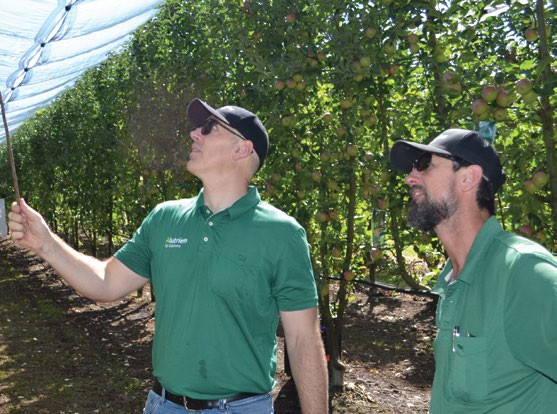disease management BUSINESS
Data
SHARING
Nutrien’s regional focused research field trials are not just beneficial to the grower, but also provide critical data for the wider industry.
A RESURGENCE in interest for export production makes disease management research a must for those wanting to capitalise on this surge. Nutrien’s product development agronomist for horticulture Scott Paton points to field research trials as a must to create tailored solutions to disease.
“Our trials generate valuable, independent and scientifically valid data sets for agronomists to reference and to share with the wider industry,” he explains. “It means our agronomists are more confident with recommendations for varying conditions and problems they may encounter; suppliers have a better understanding of how their product is being used in the market; and growers and the wider hort industry benefit from an increased practical understanding of disease management.”
Most recently, Nutrien Ag Solutions has been conducting trials in the Manjimup region of Western Australia. Its focus has been to assess the behaviour of powdery mildew and alternaria pathogens in commercial production blocks of Rosy Glow apples. The trial work has allowed comparisons of various commercial fungicides and their behaviour against different stages of disease lifecycle development.
Nutrien’s Manjimup agronomist Adam Chapman says gone are the days of creating a diseasemanagement plan upfront. Instead, it’s about taking an adaptive mindset. For this, he explains, it is essential to conduct trials, understand what is happening in the crops and use that knowledge to create a tailored plan.
“This is important information to understand when establishing management plans and adapting strategies to growing conditions or disease expression rates. Much of this data will be discussed during disease-management discussions with growers in the coming months,” Scott says.
“It allows us to assess the value of different fungicide products, and formulate adaptable strategies suited to both export and domestic production systems. Various fungicides have different withhold periods when used in export production and this can result in sizable changes to the disease-control strategies we deploy with growers,” he says.
Field extension walks were also conducted over the course of the summer as part of the industry presentations following the trials. Nutrien offers this service to any horticulture grower wanting to relook at a current plan or solve issues that have the potential to impact production.

Scott Paton sees client trials as a boon for growers.
Industry collaboration
Scott Paton, product development agronomist for horticulture at Nutrien, ensures their trial program is an asset to the wider industry.
Benefits of a trial program:
• Deeper insight into the behaviour of a wide variety of fungicide active ingredients
• The difference between a label claim for pathogen control and one of suppression
• Demonstration of the wide range of pathogen suppression that can be observed
• The degree of efficacy that fungicides have on both primary and secondary infection stages within a lifecycle.
FOR MORE INFORMATION
If you are looking to update your plan, have concerns over your current plan or want to target certain IPDM issues, contact your local agronomist and ask for a trial.